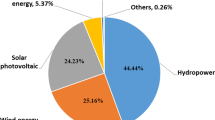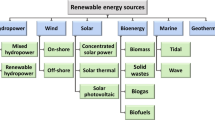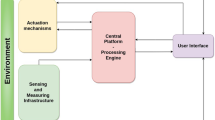Abstract
Global and regional climate changes produce a significant effect on energy production and consumption, especially on heating and air conditioning in residential, industrial, commercial, and office rooms. In Russia, with its contracting climate conditions, energy consumption varies a lot in different regions. Thus, we have to review the dynamics of energy consumption during the cold season individually for each region of the country. We analyzed the dynamics of duration and temperature of the heating season in Moscow region and completed a comparative study of heat energy consumption, actual and calculated based on the 'degreedays' concept, in the municipal economy of Moscow during the last decade. Based on the actual data analysis, we proved that conservation of energy resources in a large city relies not so much on a shortening of the heating period as on the growth of atmospheric air temperature in winter. The projected climate warming in the Moscow region in the nearest decades, along with measures of energy conservation, will promote a significant reduction in energy consumption of the municipal economy in winter. The results shown in this article were obtained in the process of preparing and implementing project no. 16-17-00114 by the Russian Science Foundation “Analysis of an impact of the regional climate change on the residential and commercial energy consumption of Russian megacities,” within the main area of focus of the Russian Science Foundation, which is “Fundamental Research and Exploration in Main Topical Areas of Focus.” The project was implemented within the framework of the scientific area of focus, which is “Reduction of the Risk and Mitigation of Consequences of Natural and Man-made Disasters” (“Studying Economical, Political, and Social Consequences of Global Climate Changes” problem).
Similar content being viewed by others
References
Climate Change 2014: Synthesis Report. Contribution of Working Groups I, II and III to the Fifth Assessment Report of the Intergovernmental Panel on Climate Change, Ed. by Core Writing Team, R.K. Pachauri and L.A.Meyer (Intergovernmental Panel on Climate Change, Geneva, Switzerland, 2014).
Second Estimating Report of Russian Hydrometeorological Office on Changes of Climate and Their Consequences on Russian Federation Territory. General Summary (Rosgidromet, Moscow, 2014) [in Russian].
V. V. Klimenko, A. V. Klimenko, A. G. Tereshin, and O. V. Mikushina, “Change of heating period parameters on the European territory of Russia as a result of global warming,” Izv. Ross. Akad. Nauk., Energetika., No. 2, 10–27 (2002).
V. V. Klimenko, A. G. Tereshin, D. S. Beznosova, O. V. Mikushina, and T. N. Andreichenko, “Change of heating period parameters on the Asian territory of Russia as a result of global warming,” Izv. Ross. Akad. Nauk., Energetika., No. 4, 135–145 (2004).
V. V. Klimenko, “Climate change impact on the heat demand in Russia,” Energiya, No. 2, 2–8 (2007).
A. S. Ginzburg, I. N. Belova, and N. V. Raspletina, “Antropogenic heat fluxes in urban agglomerations,” Dokl. Earth Sci. 439, 1006–1009 (2011).
G. G. Aleksandrov, I. N. Belova, and A. S. Ginzburg, “Antropogenic heat flows in the capital agglomerations of Russia and China,” Dokl. Earth Sci. 457, 850–854 (2014).
A. S. Ginzburg, “Regional and temperature maxima and the possibility of their simple energy-balance estimates,” Izv. Atmos. Ocean Phys. 47, 665–671 (2011).
B. G. Sherstyukov, “Climatic conditions of the heating period in Russia in XX and XXI centuries,” Tr. Vseross. Nauchno-Issled. Inst. Gidrometeorol. Inform.–Mirovoi Tsentr Dannykh. No. 173, 163–170 (2007).
V. V. Klimenko, A. G. Tereshin, and O. V. Mikushina, “Changes of climatic parameters and their role in the work of heat supply systems of the country,” Nov. Teplosnabzheniya, No. 8, 5–13 (2008).
Y. Arnold, “Maximum-minimum temperatures as a basis for computing heat units,” Proc. Am. Soc. Hortic. Sci. 76, 682–692 (1960).
X. Tu, Zh. Li, J. Wang, X. Huang, J. Yang, Ch. Fan, H. Wu, Q. Wang, and Z. Zhang, “Improving the degree-day model for forecasting Locusta migratoria manilensis (Meyen) (Orthoptera: Acridoidea),” PLoS One. 9, e89523 (2014). doi 10.1371/journal.pone.0089523
M. Isaac and D. P. Van Vuuren, “Modeling global residential sector energy demand for heating and air conditioning in the context of climate change,” Energy Policy 37, 507–521 (2009).
D. Wiedenhofer, M. Lenzen, and J. K. Steinberger, “Energy requirements of consumption: Urban form, climatic and socio-economic factors, rebounds and their policy implications,” Energy Policy 63, 696–707 (2013). doi 10.1016/j.enpol.2013.07.035; ISSN 03014215
“Eurostat. Heating degree-days by NUTS2 regions–annual data,” Eurostat, 2012. http://appsso.eurostat.ec. europa.eu/nui/show.do?dataset=nrg_esdgr_a&lang=en.
A. Ginzburg and V. Ol’khov, “How many does caprice of weather cost?” Risk Menedzhment, 1, 60–67; 2, 67–71 (2008).
SP 131.13330.2012. Building Climatology (Ministry of Regional Development of Russian Federation, Moscow, 2012) [in Russian].
P. P. Biryukov, “Perspectives of development of Moscow energetics,” Toplivno-Energ. Kompl. 11, 105–107 (2011).
Resolution of Moscow Government from 09.2012 Mo. 37-RR “On Approval of General Scheme of Energetic Supply of Moscow to 2020”.
Author information
Authors and Affiliations
Corresponding author
Additional information
Original Russian Text © A.S. Ginzburg, O.A. Reshetar, I.N. Belova, 2016, published in Teploenergetika.
Rights and permissions
About this article
Cite this article
Ginzburg, A.S., Reshetar, O.A. & Belova, I.N. Impact of climatic factors on energy consumption during the heating season. Therm. Eng. 63, 621–627 (2016). https://doi.org/10.1134/S0040601516080061
Published:
Issue Date:
DOI: https://doi.org/10.1134/S0040601516080061




